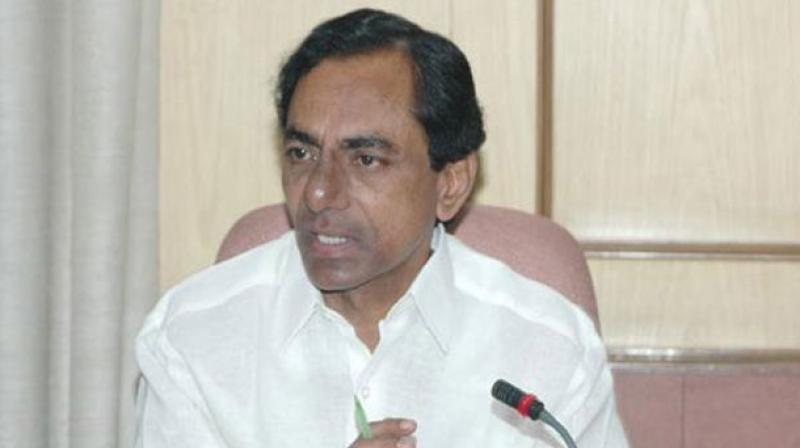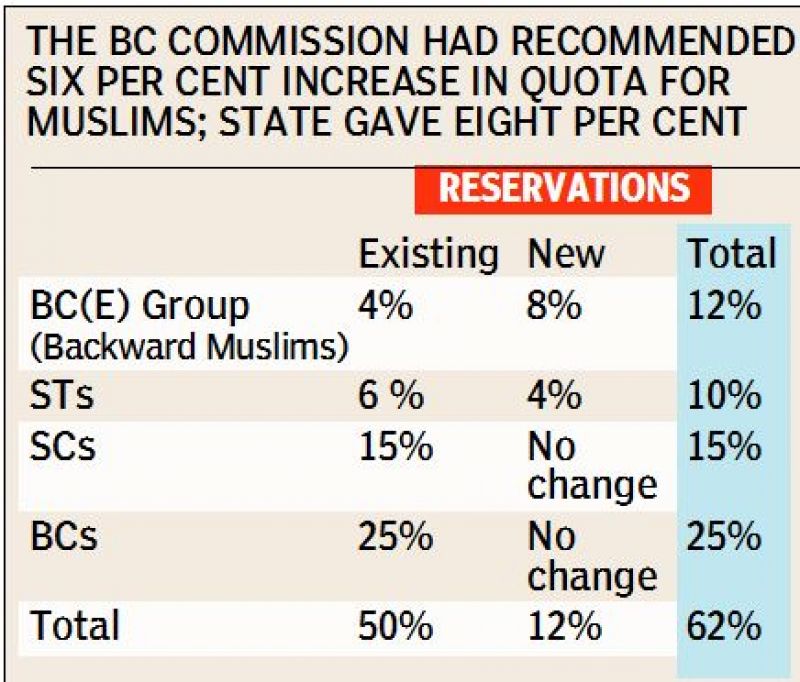Bill for 8 per cent hike in Muslim quota

Hyderabad: The Telangana state cabinet on Saturday approved the draft Bill of the Telangana Backward Classes, Scheduled Castes and Scheduled Tribes [Reservation of seats in Educational Institutions and appointments or posts in the Services under the State] Act, 2017, increasing reservations for Muslims (under Backward Classes E-category) and for Scheduled Tribes, in education and employment.
A special session of the Legislative Assembly has been convened at 11 am on Sunday to pass the quota Bill. Reservation for Muslims has been increased by eight per cent, from the existing four per cent to 12 per cent, while the Scheduled Tribes quota has been increased by four per cent, from the existing six per cent to 10 per cent.
The BC Commission, which has the power to make recommendations on quotas, has recommended only six per cent increase in reservation for Muslims, which has been clearly specified in the draft Bill. Chief Minister K. Chandrasekhar Rao said that the Muslim quota was being increased to 12 per cent in proportion to the Muslim population. The Bill has put the Muslim population of Telangana state at 12.68 per cent.
State to seek legal cover for quota Bill
The Chelleppa Commission on Scheduled Tribe reservations has recommended 9.08 per cent increase in ST reservation based on the ST population, and this has been rounded off to 10 per cent.
The draft Bill increases the overall reservation quota in the state from 50 per cent at present to 62 per cent, which is above the Supreme Court prescribed limit of 50 per cent overall quota, and thus requires the Centre’s assent.
After the Bill is passed by the Legislature, it will be reserved by the Governor for consideration and assent of the President under Article 31C of the Constitution.
The state government will also request the Centre to include the increased quota in the Ninth Schedule of the Constitution, to give legal protection along the lines of the Tamil Nadu Reservation Act, which provides 69 per cent reservation, well above the Supreme Court prescribed limit.
The BJP, the ruling party at the Centre, is strongly opposed to a quota for Muslims on the grounds that it amounts to ‘communal reservations’, which is not permissible under the Constitution.
It remains to be seen whether the BJP-led NDA government at the Centre gives its assent to the TS Muslim quota Act. The Telangana Rashtra Samiti had promised 12 per cent quota for both Muslims and Schedule Tribes in its 2014 election manifesto.
However, since the ST population in the state is below 10 per cent, the government cannot provide 12 per cent quota proportionate to their population and so has decided to cap the ST reservations at 10 per cent.
What the TS Quota Bill says:
- The Supreme Court of India, in its judgement in the Indra Sawhney vs Union of India cases reported in AIR 1993 SC 477 inter alia observed that reservations under clause (4) of Article 16 of the Constitution may exceed 50 per cent of the appointments or posts by making out a case showing existence of extraneous circumstances for exceeding the limit.
- Subsequently, Article 15 and 16 of the Constitution have been amended vide Constitution (93rd Amendment) Act, 2005 and Constitution (85th Amendment) Act, 2005 and on challenge of the same, the Supreme Court in its judgements in M. Nagaraj & others vs Union of India and others and Ashoka Kumar Thakur vs Union of India inter alia laid down that if a State wants to exceed 50 per cent reservations then it is required to base its decision of the quantifiable data.
- Clause (4) of Article 15 of the Constitution enables the State to make any special provision for the advancement of any socially and educationally Backward Classes of citizens or for the SCs and the STs.
- Clause (5) of Article 15 enables the State to make any special provision, by law, for the advancement of any socially and educationally backward classes or for SCs or STs in so far as such special provisions relate to their admission to educational institutions including private educational institutions, aided or unaided, other than minority educational institutions referred to clause (1) of Article 30.
- Clause (4) of Article 16 of the Constitution enables the State to make any provision for the reservation of appointments or posts in favour of any Backward Class of citizens which, in the opinion of the State, is not adequately represented in the services under the State.


